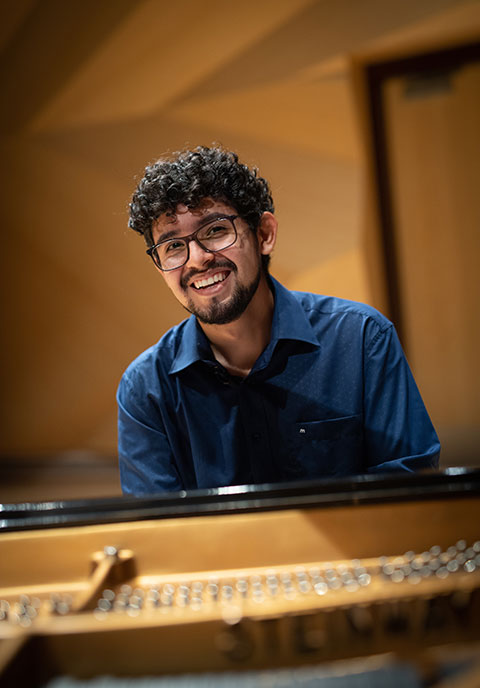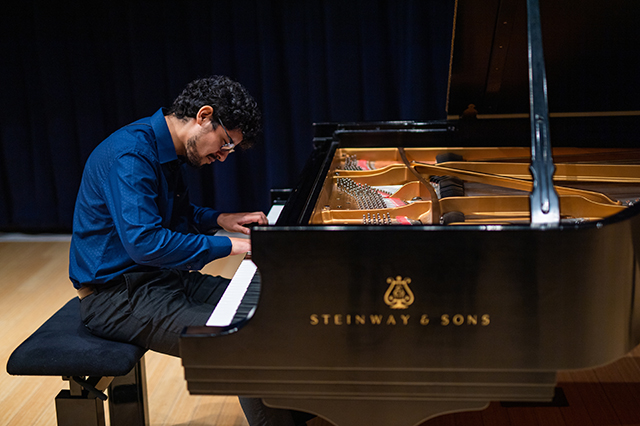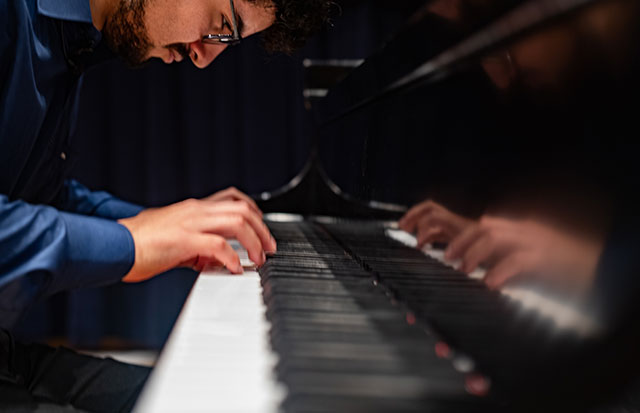Fernando López Flores had played a bit of Bach and Beethoven as well as traditional Bolivian music for the woman watching him perform on WhatsApp. But from a practice room in FGCU’s Music Building, the junior music major sensed he wasn’t quite connecting with his listener, a recovering COVID-19 patient far away in South America. When he asked what she’d like to hear as a finale, she hesitated at first before suggesting the accomplished pianist play “Twinkle, Twinkle, Little Star.”
“She told me it was the only piece she had played on the piano when she was little and that that was her nicest memory from childhood,” López Flores said. “I played it for her, and she was so happy.”

The power of music — “the universal language,” as Henry Wadsworth Longfellow famously put it — closed the distance and allowed a comforting moment amid the angst of the global coronavirus pandemic. That was the goal from the start of Musica Para Respirar (Music to Breathe) 24/7, a series of free cell-phone concerts by 14 Bolivian musicians; they pooled their time and talents to provide melodic relief to COVID-19 patients and their families as well as brave healthcare workers in their homeland and around the world.
“We wanted to find some way to support them,” said López Flores, 26, a native of Sucre, Bolivia, who was unable to return home for the summer because of pandemic travel restrictions. “Music to Breathe represents the fight that we are trying to win. What this virus takes away from you is the capacity to breathe — at a very intense level. We all 14 of us truly believe music has the power to heal the soul, mind and body. We really think what we do can make a difference. This is a time for all of us to connect more than ever.”
Those 14 musicians constitute La Sociedad Boliviana de Música de Cámara (The Bolivian Chamber Music Society), which orchestrated the intimate, inspirational recitals by taking requests via social media and matching them with members scattered around South and North America and Europe playing 12-hour shifts. The first free, around-the-clock music marathon Aug. 10-17 engaged almost 800 viewers in 355 concerts running about 8,000 minutes, López Flores said.
Sessions ranged from five minutes to two hours, with the players taking requests and chatting with their listeners. It wasn’t unusual for audience members to sing or dance along to the music — most traditional Bolivian music is danceable, López Flores said. As a prelude to playing for strangers who might need either soothing sounds or rousing rhythms, the volunteers consulted with doctors and Bolivian composer and music therapist Teresa Laredo to help them understand the needs and feelings of callers.
“What I was thinking while playing was what the next piece should feel like in terms of the emotions of the person and the state of energy that she or he had,” López Flores said. “We had to be sensitive. It was so intense to be there playing one concert after another for 12 hours. But it was just doing what I love to do — and the only thing I can do right now for them.”
New perspective on performing
Playing to an app-based audience of one, or even a handful of viewers, provided López Flores with a different take on performing. Gone was the perceived barrier between musicians spotlighted on stage and the concert audience cloaked in a darkened hall. Technology, often criticized as impersonal and detached, instead bridged the miles between player and listener.
“When I’m in front of the cell phone with one other person who sometimes is even singing the piece I’m playing, or dancing, or just being so happy while listening, I feel that creates a new perspective, a new connection,” López Flores said. “It’s a new way through which I can approach music.”

And a new way to bring music to people who might otherwise not have the opportunity or interest to attend a symphony or chamber music concert. Long before the pandemic shut down public performances, at least temporarily, audience building was a critical issue for traditional music institutions. The monthly weeklong marathons will continue at least through December and possibly beyond, according to López Flores.
“We are reaching a lot of people for whom these concerts are their very first experience with classical music or their first experience with a solo performer,” he said. “Maybe they will start being interested in learning more.”
As word of the outreach project crescendoed, additional musicians offered their services and requests for concerts came in from neighboring South American countries. Media came calling from around the world. El Pais, the second most-circulated newspaper in Spain, interviewed López Flores about Music to Breathe.
“We didn’t expect this to grow so fast — it started as something very personal, very intimate,” he said. “We were facing the stress of the pandemic and our concern for our relatives and loved ones. It was something born from the heart.”
And it’s touching lots of other hearts. As one grateful listener wrote to Music to Breathe: “My husband and I are healthcare workers. I am finishing my COVID-19 rehabilitation, and this concert really filled my soul with peace to continue in the fight.”
An engaged Eagle
That López Flores got involved something constructive and music related to help others does not surprise those who know him through FGCU’s Bower School of Music & the Arts, where he studies under Dr. Michael Baron with support from the Charles Lussenhop and Kayetta Slocum Scholarship and the Nisita Fund for Music Excellence.

The epitome of an engaged Eagle, López Flores enjoys accompanying Bower vocal students on piano. He has collaborated with Baron on research into Bolivian classical piano music and comparative studies of piano teaching methods in Bolivia and the United States.
“He’s one of our best ambassadors of the school of music and a great representation of what FGCU is all about,” said Bower School of Music Director Krzysztof Biernacki. “He’s extremely well liked by everyone. He’s one of those students who gets involved with anything – he moves pianos, he helps other students, he sets up Dr. Baron’s studio. We can always rely on him.”
López Flores, in turn, expressed his gratitude for the opportunities he’s had to broaden his world and embrace new experiences at FGCU, which he said wouldn’t have been possible without Baron or Charles Lussenhop and Kayetta Slocum of Naples. The couple met López Flores after Baron recruited him to FGCU in 2018-19 and have graciously supported his academic and personal progress ever since; they helped him to stay on campus and enroll in courses this summer when he couldn’t return to Bolivia.
“What struck us was his dedication, his passion, his focus,” Lussenhop said. “Because of that, Music to Breathe wasn’t a total surprise to us. It’s an expression of the way he is and wants to give back to others. It’s been a pleasure to see how he develops and grows.”